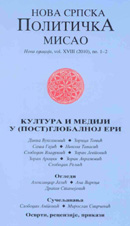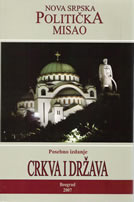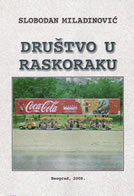| NSPM in English | |||
Revenge of the Balkans |
 |
 |
 |
| субота, 30. август 2008. | |
 Strategic shortsightedness—defined as mistaking problems and issues of secondary or tertiary importance for those of vital importance, and being unable to foresee the predictable consequences of specific actions—is becoming a chronic malaise in Washington. So characteristic of U.S. policy in the Balkans in the 1990s and the more recent Iraq tragedy, it is now again apparent in U.S. actions with regard to Kosovo, and their spillover effects in the Caucasus. American policy makers had repeatedly told us that Kosovo was supposed to be a “unique” case, but apparently Vladimir Putin didn't get the memo. The ghosts of our Balkan problems, it seems, continue to haunt us. Strategic shortsightedness—defined as mistaking problems and issues of secondary or tertiary importance for those of vital importance, and being unable to foresee the predictable consequences of specific actions—is becoming a chronic malaise in Washington. So characteristic of U.S. policy in the Balkans in the 1990s and the more recent Iraq tragedy, it is now again apparent in U.S. actions with regard to Kosovo, and their spillover effects in the Caucasus. American policy makers had repeatedly told us that Kosovo was supposed to be a “unique” case, but apparently Vladimir Putin didn't get the memo. The ghosts of our Balkan problems, it seems, continue to haunt us. The roots of the current crisis in U.S.-Russian relations spread far and wide, and some go back to the Balkans in the 1990s, especially the 1999 U.S. and NATO bombing of Serbia. Although little remarked upon in the West, NATO's first war marked a watershed in Russian perceptions of the United States and Europe, and, even more importantly, in Russia's post-Soviet evolution itself. Yegor Gaidar, one of the architects of Russia's post-Soviet economic reforms, told U.S. Deputy Secretary of State Strobe Talbott at the time “if only you knew what a disaster this war is for those of us in Russia who want for our country what you want.” The late Aleksandr Solzhenitsyn said much the same, noting that Russian views of the West, started changing with the cruel NATO bombings of Serbia. It's fair to say that all layers of Russian society were deeply and indelibly shocked by those bombings. . . . So, the perception of the West as mostly a “knight of democracy” has been replaced with the disappointed belief that pragmatism, often cynical and selfish, lies at the core of Western policies. For many Russians it was a grave disillusion, a crushing of ideals. The consequences of this shift in Russian attitudes and perceptions, both for Russia itself and for the United States, were profound. Although it is impossible to say exactly what impact the Kosovo crisis had on Vladimir Putin's rise to power—less than two months after the end of the Kosovo war he was appointed prime minister, and within seven months he had become president of Russia—the section of Russian elite opinion that he embodied, and how it felt about NATO's actions in the Balkans, is clear enough. Thus, at an historical juncture at which the primary purpose of U.S. foreign policy should have been fostering an international environment encouraging Russia's democratic transition, American policymakers chose instead to exploit Moscow's temporary weaknesses and engage in dubious military adventures (e.g., the bombing of Serbia) and strategic initiatives (e.g., NATO's expansion to Russia's borders, often in violation of previous promises made to Moscow) of questionable real value to U.S. national interests. Thomas Friedman put the matter into perspective when he recently asked “Wasn't consolidating a democratic Russia more important than bringing the Czech Navy into NATO?” After the 2003 U.S. attack on Iraq—importantly, without UN Security Council approval—Moscow's concerns about U.S. unilateralism, forcefully articulated by Putin at his February 2007 address before the Munich Conference on Security Policy—were inflamed by the U.S. push to grant Kosovo independence. At the G8 summit in Germany in June 2007, then–Russian President Putin was already signaling that what he called “universal principles” had to be applied to the frozen conflicts in Kosovo and the Caucasus, and Putin would later warn that U.S. and EU support for Kosovo's secession from Serbia was “illegal and immoral.” In the UN Security Council, Russia's permanent representative Vitaly Churkin was trying to impress upon his colleagues the gravity with which Moscow viewed the Kosovo situation, saying that the Kosovo issue could represent the most important question the Security Council dealt with in this decade, and going to the extraordinary length of organizing a Security Council fact-finding mission to the region. The warnings from Moscow over Kosovo, however, were brushed aside by Brussels and Washington, and in both places it was widely assumed that Russia would roll over when presented with a fait accompli. The result has been yet another questionable foreign policy initiative for the Bush administration. Six months after declaring independence, only forty-six countries have recognized Kosovo. The EU itself cannot agree on a position, with six of the twenty-seven members refusing to recognize the breakaway Serbian province. Most of the remaining countries that have recognized Kosovo include the likes of San Marino, Liechtenstein, the Marshall Islands and Burkina Faso. None of the BRIC countries (Brazil, Russia, India and China) have recognized, nor has Indonesia (the largest Muslim country in the world), nor any of the Arab states. All told, three-fourths of the international community is following Moscow's lead on the Kosovo issue rather than Washington's. In the Caucasus, meanwhile, Kosovo's declaration of independence on February 17 led to an immediate increase in tensions. Call the Russians what you will, but you can't say that they are not fast learners. In the current crisis, Moscow copied Washington's Kosovo playbook in full, accusing Georgian forces of ethnic cleansing and war crimes, labeling Saakashvili a war criminal (just as Washington had done in 1999 with Slobodan Milosevic), and claiming that Georgian actions had disqualified it from ruling over South Ossetia and Abkhazia in the future. Much like NATO officials had done in 1999, Russian officials also claimed that their intervention in Georgia was based on “humanitarian” motives. In fact, Russian foreign minister Sergei Lavrov specifically compared Russian military actions in Georgia to NATO's actions in Serbia. According to Lavrov, Our military acted efficiently and professionally. It was an able ground operation that quickly achieved its very clear and legitimate objectives. It was very different, for example, from the U.S./NATO operation against Serbia over Kosovo in 1999, when an air bombardment campaign ran out of military targets and degenerated into attacks on bridges, TV towers, passenger trains and other civilian sites, even hitting an embassy. In this instance, Russia used force in full conformity with international law, its right of self-defense, and its obligations under the agreements with regard to this particular conflict. Russia could not allow its peacekeepers to watch acts of genocide committed in front of their eyes, as happened in the Bosnian city of Srebrenica in 1995. Lavrov is on strong ground here; both Human Rights Watch and Amnesty International have determined that many of NATO's actions in 1999 constituted attacks against illegitimate civilian targets, if not outright war crimes. The Russians also seem relatively unmoved by Western accusations that they are intent on “regime change” in Georgia; probably with good reason, because in the Balkans the United States and the United Kingdom have recently been involved in a bit of regime change themselves. After Serbia's May parliamentary elections, the American and British ambassadors in Belgrade played key roles in the formation of a coalition government that removed Vojislav Kostunica, the man who defeated Slobodan Milosevic at the polls, from the prime ministership. The parties in the coalition government these ambassadors helped bring into office—believe it or not—include Slobodan Milosevic's former Socialist Party, and the party of the assassinated Serbian gangster-cum-warlord Zeljko Raznatovic-Arkan, whose paramilitaries were involved in numerous war crimes in Bosnia, Croatia and Kosovo. Apart from Kostunica's uncompromising stance on defending Serbia's territorial integrity regarding the Kosovo issue, it is hard to see what the American and British ambassadors had against him. Perhaps they didn't like Kostunica's translation of the Federalist Papers . Or maybe they had some issues with his scholarly work on Rousseau and Tocqueville. Predictably, Washington neocons are now invoking a new cold war against Russia. Russians themselves, meanwhile, are growing tired of the double standards they see Washington using against them. Former–Soviet President Mikhail Gorbachev, for example, summed up the feelings of many of his compatriots when he questioned the value of Russian participation in international institutions: For some time now, Russians have been wondering: if our opinion counts for nothing in those institutions, do we really need them? Just to sit at the nicely set dinner table and listen to lectures? Indeed, Russia has long been told to simply accept the facts. Here's the independence of Kosovo for you. Here's the abrogation of the Antiballistic Missile Treaty, and the American decision to place missile defenses in neighboring countries. Here's the unending expansion of NATO. All of these moves have been set against the backdrop of sweet talk about partnership. Why would anyone put up with such a charade? Why indeed? You do not have to be Russian to see the weak foundations on which so much of official Washington's criticisms of Russia are based. As David Remnick recently noted in the New Yorker , Even ordinary Russians find it mightily trying to be lectured on questions of sovereignty and moral diplomacy by the West, particularly the United States, which, even before Iraq, had a long history of foreign intervention, overt and covert politics by other means. After the exposure of the Bush Administration's behavior prior to the invasion of Iraq and its unapologetic use of torture, why would any leader, much less Putin, respond to moral suasion from Washington? That is America's tragedy, and the world's. Developing a serious policy for dealing with a more powerful and assertive Russia will of necessity be high on the agenda of the next presidential administration. In the 1990s, Washington policy makers may have been able to ignore Russia's views, or to delude themselves into believing that Russia would never be a serious international player again. But those days are over. This makes it even more urgent for U.S. policy makers to better understand the strategic importance of preventing a renewed downturn in U.S.-Russian relations. Ideological rants, moral outrage and attempts to paint the world in black and white make good TV, but they are dangerous when applied to complex problems that, upon careful and thoughtful analysis, reveal themselves in shades of gray. The late, great American diplomat and statesman (and lifelong Russia hand) W. Averell Harriman once said, “To base policy on ignorance and illusion is very dangerous. Policy should be based on knowledge and understanding.” Harriman would probably be mortified today at the thought that so much of US policy appears based not on ignorance and illusion, but perhaps on something far worse—contempt, be it for post-Soviet Russia, for “old Europe,” or for the United Nations and the Geneva Conventions. For some in Washington, perhaps, even contempt for our own democratic principles and traditions. Gordon N. Bardos is assistant director of the Harriman Institute at Columbia University's School of International and Public Affairs. 08.28.2008 |
Остали чланци у рубрици
- Playing With Fire in Ukraine
- Kosovo as a res extra commercium and the alchemy of colonization
- The Balkans XX years after NATO aggression: the case of the Republic of Srpska – past, present and future
- Из архиве - Remarks Before the Foreign Affairs Committee of the European Parliament
- Dysfunction in the Balkans - Can the Post-Yugoslav Settlement Survive?
- Serbia’s latest would-be savior is a modernizer, a strongman - or both
- Why the Ukraine Crisis Is the West’s Fault
- The Ghosts of World War I Circle over Ukraine
- Nato's action plan in Ukraine is right out of Dr Strangelove
- Why Yanukovych Said No to Europe

.jpg)






















